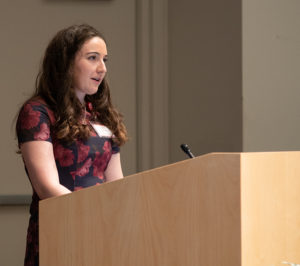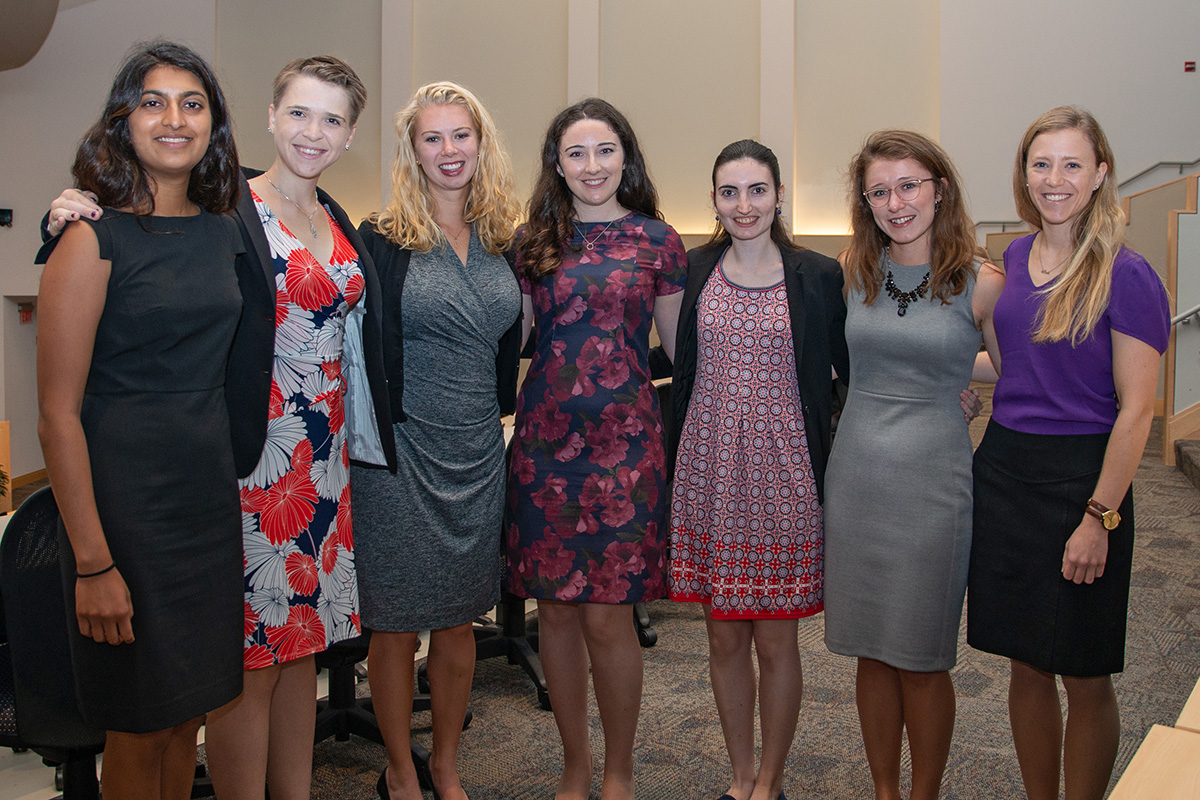When Laurie J. Punch, MD, enters a patient’s room, she is careful and deliberate with introductions. As a trauma surgeon who also happens to be a black woman, Punch must navigate daily the fact that many people do not see a doctor when she enters the room.
“I introduce myself as the patient’s surgeon and begin discussing test results and scans, explaining the treatment plan I have developed,” Punch said. “I try to warm people up to the idea that I’m their doctor. If I don’t make a point of demonstrating this right away, they might ask me to bring them a Sprite or a Coke. But I have to let the microaggressions roll off and keep doing my job.”
Punch, an associate professor of surgery at Washington University School of Medicine in St. Louis, spoke of her experience Sept. 8 at the American Medical Women’s Association (AMWA) Midwest Conference, held for the first time at Washington University. The audience included about 200 women, half of whom were undergraduates on a pre-medical track, the other half current medical students.
“This conference is a culmination of what matters most to me: supporting the advancement of women in medicine,” said Katherine Gerull, a third year medical student at Washington University who led the conference organizing committee. She also is the student Midwest regional director of AMWA.

“I’m incredibly impressed that so many students from across the region — from six states and 12 universities — have come together today to hear from some of the most esteemed faculty in the country,” Gerull said. “The speakers have been so generous with their time, spending a Saturday with us. I think it’s important to expand and diversify the faces of medical leadership, and it takes organizations like AMWA, helping women support and amplify one another so that we can begin to drive that change.”
Gerull highlighted the importance of women supporting other women as they start their careers. This sentiment was echoed by Victoria J. Fraser, MD, the Adolphus Busch Professor and head of the Department of Medicine, who addressed the group.
“We hope to advance the success of female medical students and physicians and begin to reduce the gap in the number of women in leadership roles,” Fraser said. “To do that, we need to start preparing early — high school students, undergraduates and medical students. When asked to describe a leader, people tend to think of men or traditionally masculine traits.
“To change this, we need women to start picturing themselves in leadership positions as they first begin their careers in medicine,” she added. “The women who organized this conference — all Washington University medical students — are off to a great start.”

Data show that women in traditionally male fields — and particularly women who are members of underrepresented minority groups — face many conscious and unconscious biases and tricky-to-navigate barriers throughout their careers and, indeed, on a typical work day. For example, when Robyn Klein, MD, PhD, a professor of medicine, of neuroscience, and of pathology and immunology, asked the organizers of a 2016 neuroimmunology conference why there were only 13 women among the 85 speakers at the conference, she was told there just weren’t as many highly qualified women in the field.
“Well, that was like sticking a hot poker in a bull,” Fraser said. “Dr. Klein went out and gathered data to test if this was correct. She published a paper showing men and women in neuroimmunology have equal numbers of publications in the highest impact journals. The conference organizers invited more women based on this analysis, but the fact that it had to be done in the first place shows the kinds of assumptions women are up against.”
In medical school, the statistics look good. About half of incoming medical students are women, and that has been true for nearly two decades. But the proportion of women in medicine drops precipitously at later stages of medical careers. One possible reason for this loss of female talent is because, as several conference speakers discussed, women tend to be over-mentored but under-sponsored compared with men.
Dedicated mentors who give great career advice are vital for any physician to do well. But sponsors are perhaps more directly important for advancement, and young doctors have little control over their own sponsorship. Sponsors don’t simply give advice but actively nominate people for awards, recommend or appoint them to leadership positions or organize speakers to present their work at major conferences. Data, including Klein’s, show that faculty in these types of leadership positions tend to be men, and that these men tend to name other men when asked to recommend talented up-and-comers who should receive such opportunities.
But beyond highlighting the problem, Klein’s study pointed to some possible solutions. She found that representation matters — when a conference organizing committee is about half women, the invited speakers are about half women. Plus, the conference committee that prompted Klein to do the study was responsive and invited more highly qualified women when the disparity was pointed out to them.
Klein’s work and similar data show the importance of highlighting unconscious bias where it exists. If the problem is not identified, there can be no solution.
Bariatric surgeon Arghavan Salles, MD, PhD, an assistant professor of surgery, also offered sobering statistics. When introducing female physicians, men are less likely to use a formal title, such as “Doctor,” than when introducing male physicians. And some evidence suggests women who apply for grants need the grant reviewers to find their work extraordinary versus simply good in order to get funding.
And at the same time, there is data from some sources that associate female doctors with better outcomes for patients overall. Studies have suggested that patients who see female surgeons have lower readmission rates and fewer deaths when compared with those seen by male surgeons. Another recent study — authored by Washington University researchers — showed that people in general, and women in particular, are more likely to survive a heart attack when the doctor who treats them is a woman.
“The big quotable statistic in one of those studies was that if men achieved the same outcomes as women, some 30,000 more people would be alive,” Salles said. She also cautioned, “That number is an extrapolation, and these are all association studies. They can’t prove that women are better doctors than men. But I also think they make it very hard to argue that women are not just as good.”
The conference emphasized many aspects of medical career tracks that women can change or boost for themselves. But much of it was also about bringing awareness to those aspects of the career path that won’t change until the culture changes. And for women and minorities, the way to change the culture is to be present and work toward equity, where all people have the same opportunities.
“We need you to be you,” Punch said to the young women just starting their journeys in medicine. “We need the authentic you and not who you think you’re supposed to be. Every morning as I’m driving to work, I play certain music and I say to myself, ‘My job today is to love people.’ Find like-minded people. For me, finding people who share my values — who care about the patients I care about — is how I found the path to my most joyous work.”
Punch and her fellow speakers may have inspired an auditorium full of like-minded women. And organizations like AMWA may be one way women can find others doing the work they value most. Other resources and organizations at Washington University that support women in medicine include the Academic Women’s Network (AWN) and the Forum for Women in Medicine (FWIM).
Washington University School of Medicine’s 1,300 faculty physicians also are the medical staff of Barnes-Jewish and St. Louis Children’s hospitals. The School of Medicine is a leader in medical research, teaching and patient care, ranking among the top 10 medical schools in the nation by U.S. News & World Report. Through its affiliations with Barnes-Jewish and St. Louis Children’s hospitals, the School of Medicine is linked to BJC HealthCare.
Media Contact
Diane Duke Williams, Associate Director for Media Relations
314-286-0111
Writer
Julia Evangelou Strait, Senior Medical Sciences Writer
Julia Evangelou Strait covers the McDonnell Genome Institute, cardiology, developmental biology, radiation oncology and other cancer-related news. She has a bachelor’s degree in engineering science from Iowa State University and a master’s degree in biomedical engineering from the University of Minnesota.
314-286-0141
Source: Read Full Article
